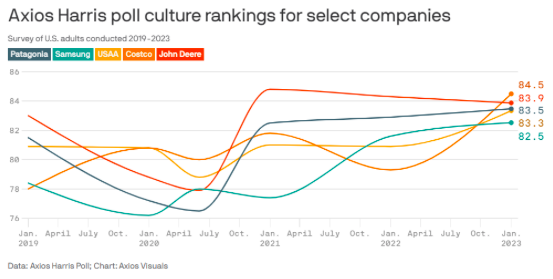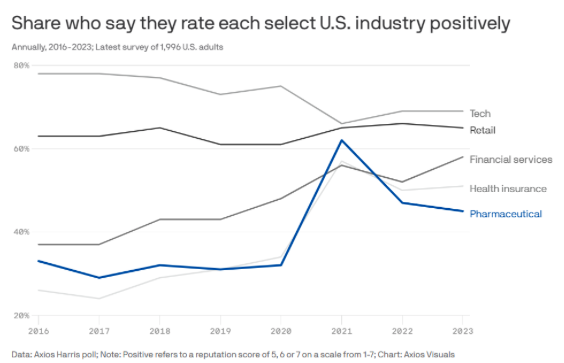Brief • 5 min Read
The latest trends in culture and society from The Harris Poll.
Last night, Harris Poll CEO John Gerzema capped off the Forbes Iconoclast Impact Summit at the New York Stock Exchange by discussing the future of capitalism with Forbes CMO Network’s Seth Matlins, Goodby Silverstein & Partners’ Jennifer Gomes, Ed.D., and ICE’s CMO Stephanie Dobbs Brown.

The highlights:
- (46%) believe that today’s capitalism is headed in the wrong direction.
- (62%) say it isn’t working for younger generations as it did for older ones.
- (62%) agree that capitalism isn’t allowing Americans to meet their basic needs (Gen Z: 66%, Women: 65%, BIPOC: 65%).
But…
- (70%) say that while capitalism isn’t perfect, it’s still the best option (BIPOC: 65%, Women: 66%, Gen Z: 57%).
- (58%) feel capitalism leads to innovation and creativity rather than stagnation.
- (57%) are willing to pay more for goods and services to guarantee living wages for workers.
Big shout outs to to our resident capitalist study authors Libby Rodney and Jacklyn Cooney. For a deeper dive into their Forbes-Harris Poll capitalism findings, click here. And to read more about Forbes’ Rebranding Capitalism, click here.
Other news…According to our America This Week survey, fielded June 9th to 11th among 2,037 Americans, (75%) are worried about being directly affected by poor air quality as a consequence of climate change and environmental risks. However, recent Harris data with R-Zero find extended periods of time spent indoors have their own health impacts, such as headaches (39%), nose or throat irritation (33%), and fatigue (32%). Maybe keep that N95 from 2020 handy…
Here’s what else we’ve got this week…A look into firms with the best company culture from our new Axios Harris Poll 100. Also, the struggle to cover emergency costs is growing in a new Harris survey with NerdWallet. Next, we dive into the move away from defensive health to the proactive kind with Axios. And lastly, hidden in the job report numbers is the growing trend of more companies reskilling instead of outside hiring.
You can download the new ATW monthly summary tabs and May deck here.
Brands Benefit From Strong Corporate Cultures: The Axios Harris Poll 100
A company’s employer brand – the way its culture and employee experience is perceived – has a major impact on its overall reputation, according to this year’s Axios Harris Poll 100 ranking, as detailed by Axios’ Eleanor Hawkins.
- Why it matters: Consumers increasingly care about the internal workings of a company and favor those that are ethical, exhibit good citizenship and have a strong company culture.
- The companies with the best culture – Patagonia, Costco, John Deere – also make up the highest rated overall. Other top-scoring brands include USAA, Samsung, Honda Motor Company, Chick-fil-A, Trader Joe’s, Apple, and Microsoft.

- A culture rebrand may make or break relevancy: (79%) say that companies will need to rebrand and evolve to stay relevant in the coming years, and yet (75%) agree that companies are “rebranding” their products and services when they should be rebranding their ethics and values.
Takeaway: Consumers are growing more and more aware of corporate culture and the perception of a brand’s ethics and citizenship, both to their employees and their customers. And companies will need to take note in order to boost their reputation, for example, when asked what brands could be doing best to support consumers given the current state of the economy, the number one answer was paying their employees a decent living wage (50%), ahead of reward programs, discounts, etc.
The Potential Emergency Financial Knockdown (NerdWallet-Harris Poll)
Having a cushion in case of financial emergencies is a hallmark of financial health, and it’s the top-cited goal of savers. But emergency savings can be a struggle to save for, according to our latest research with NerdWallet.
- Saving for emergencies is the most-cited savings goal: More than half of Americans (53%) regularly save for emergencies, while (43%) regularly save for retirement and (42%) for vacations.
- Yet – existing emergency funds may come up short: Less than half (45%) of Americans would be able to cover a $1,000 emergency expense without turning to a credit card or loan.
- Leading to many Americans (73%) being concerned about affording their living expenses, according to the latest America This Week polling, a number that has increased from (69%) in early December 2022.
Takeaway: In a perfect world, you’d have several months of living expenses set aside in case of an emergency such as a job loss. But amassing this kind of fund takes time. Start with smaller goals: If you have nothing, work your way up to a $500 emergency fund. If you have a few hundred dollars, set your sights on a month’s worth of living expenses. Every bit helps when you find yourself unexpectedly in need of extra cash, so do what you can.
Moving On From Defensive Health: The Axios Harris Poll 100
Healthcare companies were less visible and less reputable for most Americans last year compared to earlier in the pandemic, according to new rankings from the annual Axios Harris Poll 100, as detailed by Axios writer Tina Reed.
- Why it matters: The pandemic crisis put drugmakers, insurers, and other health sector players at the top of most everyone’s mind. Now, Americans have shifted their focus to companies that offer more tangible services.

- The intrigue: Pharmaceutical company and COVID vaccine maker Pfizer ranked 50th in the poll and ranked among the top-performing companies among Democrats. While Pfizer saw its scores related to its trajectory and products improve, consumers’ trust in the brand, as well as their feelings about its growth, vision, citizenship, ethics, and culture declined.
- Retail pharmacy giant CVS ranked 19th among the 100 brands survey respondents identified as most visible in the country today, up from a ranking of 36th last year. Competitor Walgreens was also on the list, ranked 39th, and both are part of a race to expand their healthcare delivery footprints.
- Convenience may be a key driving force: Recent Harris-American Academy of Physician Associates poll results found the average wait time to see a doctor is 3.9 weeks, and as Harris Poll CEO John Gerzema told Axios, “The natural benefactors of that are the retail physicians. It’s just far more convenient, it’s accessible. As both Walgreens and CVS are moving rapidly in that space… they’re positioning themselves as a frictionless health care experience.”
Takeaway: We’ve seen significant increases in Americans owning their own health and a heightened desire to take better care of themselves. As compared to pre-pandemic times, Americans today are prioritizing their physical activity (46%), their health habits and goals (45%), and their mental health (41%) more, according to our latest America This Week polling.
The Reskilling Discount: Express Employment Professionals-Harris Poll
In recent research in partnership with Express Employment Professionals in Supply Chain Dive, companies on the hunt for new talent are turning to reskilling as a viable solution to labor and skills shortages.
- Seven in ten (70%) hiring managers say they would prefer to train their current employees for different roles before bringing on new workers.
- Employees are already investing in their own development: According to our America This Week polling, two-thirds (66%) of American workers say they are already learning new skills and doing professional development in order to advance in their careers.
- But employees and employers agree companies have a responsibility: U.S. hiring managers and employed Americans agree employers should be responsible for providing and paying for trainings, upskilling, and/or reskilling for employees (78% each).
Takeaway: “The role of training is paramount to solving the labor shortage because it’s more of a skills gap right now versus shortage of labor,” according to Mike Nolfo, a New Jersey Express franchise owner. “Interviews have increased more than (50%) this year, but there is a major gap between applicants’ skill sets and what is required from client companies. Either clients have to embrace the upskilling of new hires, or new employees must start taking personal steps to fill in their knowledge gaps.”
Subscribe for more Insights
Subscribe to our newsletter for the latest trends in business, politics, culture, and more.
Download the Data
This survey was conducted online within the U.S. by The Harris Poll from June 9th to 11th among a nationally representative sample of 2,037 U.S. adults.
Download
Subscribe for more Insights
Subscribe to our newsletter for the latest trends in business, politics, culture, and more.
Download the Data
This survey was conducted online within the U.S. by The Harris Poll from June 9th to 11th among a nationally representative sample of 2,037 U.S. adults.
DownloadRelated Content







